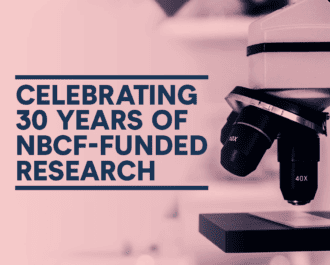 Treat
Treat
Proteins are the “building blocks” of our bodies, with each human cell containing thousands of different types of proteins with varying functions, collectively referred to as the proteome. Proteomics is the branch of science dedicated to examining proteins on a large scale, using techniques such as mass spectrometry.
Hormones, which bind to proteins known as receptors which respond to the presence of hormones are particularly important in the diagnosis and treatment of cancer. The best-known example is estrogen receptor positive breast cancer, in which the hormone estrogen binds directly to the estrogen receptor protein. The estrogen receptor is targeted with anti-estrogen drugs to block estrogen binding to the receptor and therefore inhibit cancer cell growth.
Until recently, it was not possible to determine all the proteins within a tumour, because the technology for measuring thousands of proteins simultaneously on a large scale and in a clinically-relevant way did not exist.
Now, a laboratory facility called ProCan at Children’s Medical Research Institute (CMRI) in Sydney, has provided researchers with the necessary technology to complete this task. The facility is collaborating internationally to learn more about the proteins in tumours. Professor Roger Reddel at ProCan and his colleagues at the Wellcome Sanger Institute (UK) used this novel technology for analysing 949 cancer cell lines from more than 40 cancer types including breast cancer. The cancer cells were also treated with over 650 different drugs. The massive set of data acquired was used to find patterns in the proteome that predict responses to specific types of treatment. This NBCF-funded study led to the world’s largest cancer protein database for predicting drug response and was recently published in the prestigious journal Cancer Cell.
8,498 different types of proteins were identified in the cancer cells by the researchers and can now be used as the basis for learning how to predict the response of cancer to treatment. The ultimate aim of the research is to help clinicians to determine which therapies will be most effective for different cancers. It is also likely that the findings will highlight new proteins of interest, which could lead to the development of new drugs to fight cancer.
“This study has been a collaborative team effort involving proteomics experts, software engineers, data scientists, cancer cell biologists, and medical oncology researchers that has resulted in important new insights into the interactions among thousands of key molecules within cancer cells, and the response of cancer cells to drug treatments,” said Professor Reddel.
“It is a major step towards ProCan’s goal of using proteogenomic data to help clinicians choose the best treatment for individual cancer patients.”
The proteomic map is now publicly available to facilitate collaboration and accelerate the progress of research into breast cancer and other cancer types.
More News Articles
View all News Treat
Treat

